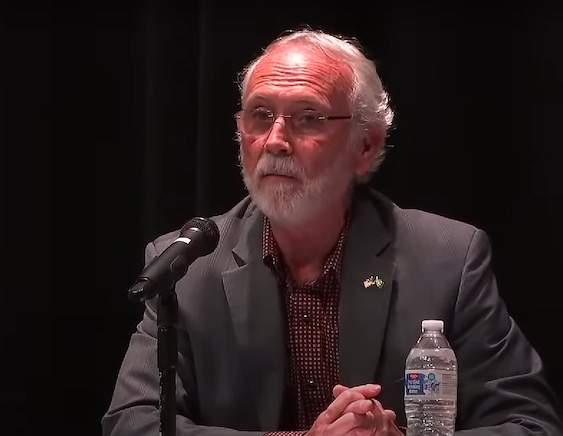forum
library
tutorial
contact

Newhouse Chides Biden Administration
on Columbia River Salmon Memo
by Randy Bracht
The Center Square, October 5, 2023
|
the film forum library tutorial contact |

|
Newhouse Chides Biden Administration
by Randy Bracht
|
Newhouse spoke of the alleged lack of transparency and "systematic overreach"
by the Biden Administration's Council on Environmental Quality
 U.S. Rep. Dan Newhouse, R-Wash., says a memorandum released last week by the Biden Administration on restoring salmon and other native fish populations in eastern Washington's Columbia River Basin tacitly supports breaching dams on the lower Snake River.
U.S. Rep. Dan Newhouse, R-Wash., says a memorandum released last week by the Biden Administration on restoring salmon and other native fish populations in eastern Washington's Columbia River Basin tacitly supports breaching dams on the lower Snake River.
"The direction from President Biden proves that his Administration and dam-breaching advocates will continue to pretend to hear feedback from the community to give the perception that residents and stakeholders are being heard," said Newhouse, who represents central Washington's 4th Congressional District, in his statement.
Newhouse and his 5th District Republican colleague, U.S. Rep. Cathy McMorris Rodgers of Spokane, have repeatedly stressed the importance of the four Snake River dams -- Ice Harbor, Lower Monumental, Little Goose, and Lower Granite -- located in their respective districts.
The dams collectively produce an average of 900 megawatts of zero-carbon energy each year, according to a study commissioned by the Bonneville Power Administration. Newhouse and McMorris Rodgers have said that power will be needed even more in the future as electric vehicles become more prevalent. The dams also make the Snake River navigable between Lewiston, Idaho and its confluence with the Columbia River, enabling barges to carry wheat and other commodities to ocean ports. Eliminating the dams would require additional truck and rail transportation, producing more hydrocarbon emissions, increased traffic, and wear on roadways.
The memorandum, titled "Restoring Healthy and Abundant Salmon, Steelhead, and Other Native Fish Populations in the Columbia River Basin," calls for the Biden Administration to work with Congress, tribal nations, state and local governments, and stakeholders to restore "healthy and abundant" salmon, steelhead and other native fish populations while securing "a clean and resilient energy future for the region (and) support local agriculture" through operational changes that also address climate change.
Fourteen federal departments and agencies are expected to identify policies to do so within 120 days, and provide assessments of needed resources to the Office of Management and Budget within 220 days.
Newhouse said the announcement "is bureaucracy at its worst and the fact remains that these dams are vital to our economy, our efforts to reduce carbon emissions, and the ability to send our commodities overseas."
The memorandum, in turn was praised by U.S. Sen. Patty Murray, D-Wash.
"I'm really glad President Biden and his administration are taking salmon recovery and Tribal treaty rights seriously and working from every angle to restore fish populations in the Columbia River Basin, while meeting the region's resiliency needs," Murray said in a Sept. 27 statement.
In August, Murray said a study commissioned by her and Washington Gov. Jay Inslee "clearly showed" the region is not ready now for a decision on dam removal. "We do not have the transportation infrastructure, we don't have the replacement for energy, we don't have the replacement for water. And if we ever were to that point, we've got a lot of work to do to get there," Murray said at the time.
Currently, there is a procedural stay in long-running court litigation over the lower Snake dams with federal mediation continuing to Oct. 31. Newhouse said affected local stakeholders and communities have been shut out of that process and are "being left in the dark as negotiations take place behind closed doors."
Newhouse spoke of the alleged lack of transparency and "systematic overreach" by the Biden Administration's Council on Environmental Quality during a hearing last month by the House Committee on Natural Resources.
In a Sept. 13 letter to CEQ chair Brenda Mallory, concerns over the lawsuit mediation process were also shared by Newhouse, McMorris Rodgers and fellow Republican Reps. Russ Fulcher of Idaho, Matt Rosendale of Montana, and Cliff Bentz of Oregon, chair of the House Natural Resources Subcommittee on Water, Wildlife and Fisheries.
"Unfortunately, it has become clear that this mediation process fails to allow meaningful input from intervenor defendants. These organizations represent millions of electricity customers, farmers, river-dependent ports, transportation and export sectors across the Northwest whose livelihoods and interests have not had a true seat at the table," the congress members wrote.
learn more on topics covered in the film
see the video
read the script
learn the songs
discussion forum
